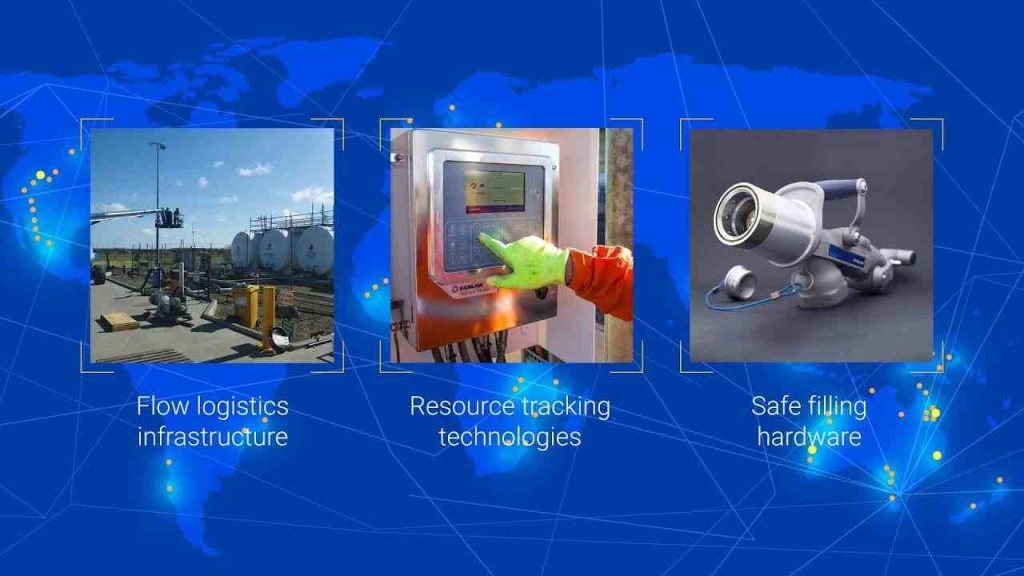Hey there, fellow truck enthusiasts in Lanham! Ever wondered how those shiny new electrical systems in trucks could potentially impact fuel efficiency? Well, get ready to plug into some fascinating insights. As technology continues to evolve, so does the way our trucks operate. So, buckle up and join us on this electrifying journey with Go-go Logistics & Transport Services LLC, as we explore the impact of upgraded electrical systems on fuel efficiency in our beloved Lanham trucks. With optimized power distribution and intelligent energy management, trucks equipped with upgraded electrical systems can potentially reduce fuel consumption, leading to cost savings and environmental benefits.

Upgraded electrical systems promise a whole new level of efficiency, but what exactly does that mean for our fuel consumption? From advanced engine management systems to smart alternators, these upgrades have the potential to revolutionize the way our trucks use energy. Reliable electric services are crucial in ensuring the seamless integration and performance of these advanced electrical components, further enhancing the efficiency and sustainability of Lanham trucks.
Understanding Upgraded Electrical Systems
Upgraded electrical systems in trucks encompass a range of advanced components and technologies designed to enhance performance, efficiency, and reliability. The intersection of technology and truck electrical repairs involves systems that surpass traditional setups, integrating innovations like advanced engine management systems, smart alternators, and optimized power distribution networks. By leveraging cutting-edge technology, upgraded electrical systems aim to improve overall vehicle operation and reduce fuel consumption.
The Role of Advanced Engine Management Systems
Enhancing the security of your truck’s electrical system involves advanced engine management systems, which are pivotal in optimizing fuel efficiency and performance. These sophisticated systems utilize sensors, actuators, and electronic control units (ECUs) to monitor and adjust engine parameters in real-time. By precisely controlling fuel injection, ignition timing, and other variables, advanced engine management systems optimize combustion efficiency and reduce fuel consumption.

Exploring Smart Alternators
Smart alternators adjust output based on the vehicle’s electrical needs, optimizing fuel efficiency by reducing the engine load during low-demand periods. Additionally, they feature regenerative braking, capturing energy during deceleration to recharge the vehicle’s battery. Understanding and maintaining these components are crucial in troubleshooting and resolving dashboard electrical issues in trucks. Addressing truck dashboard electrical problems involves understanding the role of smart alternators, integral to upgraded electrical systems. These alternators provide efficient power generation and management, unlike traditional ones that operate at a fixed output.
Benefits of Optimized Power Distribution
Optimized power distribution is essential for ensuring efficient and reliable operation of upgraded electrical systems in trucks. By strategically routing electrical power to various components and subsystems, optimized power distribution minimizes energy losses and maximizes system performance. This ensures that critical functions such as lighting, climate control, and onboard electronics receive adequate power while minimizing excess consumption. Additionally, optimized power distribution helps prevent voltage fluctuations and electrical failures, enhancing overall system reliability and durability in Lanham trucks.
Importance of Intelligent Energy Management
Intelligent energy management is a fundamental aspect of upgraded electrical systems, responsible for coordinating power usage and optimizing efficiency. This involves monitoring energy consumption in real-time and dynamically adjusting system parameters to minimize waste and maximize performance. Intelligent energy management systems prioritize power delivery based on the vehicle’s operational needs, ensuring that essential functions receive priority while non-essential systems are efficiently managed. By intelligently managing energy usage, these systems contribute to reduced fuel consumption, extended battery life, and enhanced overall efficiency in Lanham trucks.
Potential Fuel Consumption Reductions
One of the primary objectives of upgraded electrical systems is to reduce fuel consumption in trucks. By incorporating advanced technologies such as smart alternators, optimized power distribution, and intelligent energy management, these systems aim to minimize energy waste and improve overall efficiency. The potential fuel consumption reductions offered by upgraded electrical systems can lead to significant cost savings for truck operators and fleet owners. Additionally, reduced fuel consumption translates to lower greenhouse gas emissions, contributing to environmental sustainability and regulatory compliance in Lanham trucks.
Cost Savings Associated with Upgraded Electrical Systems
While the initial investment in upgraded electrical systems may seem significant, the long-term cost savings can outweigh the upfront costs for truck operators and fleet owners. By reducing fuel consumption, optimizing performance, and minimizing maintenance requirements, upgraded electrical systems can lead to substantial savings over the lifetime of the vehicle. Additionally, improved reliability and durability result in fewer unexpected repairs and downtime, further reducing operating costs. When considering the total cost of ownership, including fuel expenses, maintenance, and repair costs, upgrading to advanced electrical systems can provide a favorable return on investment for Lanham trucks.
Environmental Impacts and Benefits
In addition to cost savings, upgraded electrical systems offer environmental benefits by reducing fuel consumption and emissions in trucks. By improving fuel efficiency and minimizing energy waste, these systems help mitigate the environmental impact of commercial trucking operations. Reduced fuel consumption translates to lower greenhouse gas emissions, contributing to air quality improvements and climate change mitigation efforts. Additionally, advancements in electrical system technology enable the integration of alternative power sources such as hybrid or electric drivetrains, further reducing reliance on fossil fuels and promoting sustainable transportation solutions in Lanham trucks.
Integration Challenges and Solutions
While the benefits of upgraded electrical systems are clear, their integration into existing truck platforms may present challenges for manufacturers and fleet operators. Compatibility issues, system complexity, and integration costs are some of the key challenges that need to be addressed during the implementation process. However, advancements in modular design, standardized interfaces, and aftermarket solutions are helping to overcome these challenges and facilitate the adoption of upgraded electrical systems.
Considerations for Implementing Upgraded Electrical Systems
When considering the implementation of upgraded electrical systems in trucks, several factors need to be taken into account to ensure successful integration and performance. These include vehicle specifications, operational requirements, budget constraints, and regulatory compliance considerations. Fleet operators should conduct a thorough needs assessment and cost-benefit analysis to determine the most suitable electrical system upgrades for their specific applications. Additionally, collaboration with experienced suppliers and service providers can help streamline the implementation process and ensure that upgrades are tailored to meet the unique needs of Lanham trucks.
Future Trends in Truck Electrical Systems
Looking ahead, the evolution of truck electrical systems is expected to continue, driven by advancements in technology, regulatory requirements, and market demands. Future trends may include increased electrification, connectivity, and automation, leading to more sophisticated and integrated electrical architectures in trucks. This could entail the widespread adoption of electric drivetrains, advanced driver assistance systems, and vehicle-to-infrastructure communication technologies. Additionally, developments in energy storage, renewable power generation, and predictive maintenance are likely to further enhance the efficiency and reliability of electrical systems in Lanham trucks.

Conclusion
In conclusion, upgraded electrical systems represent a pivotal advancement in the realm of trucking, offering a multitude of benefits ranging from improved fuel efficiency and cost savings to environmental sustainability. By incorporating advanced technologies such as smart alternators, optimized power distribution, and intelligent energy management, these systems have the potential to revolutionize the way trucks utilize energy and operate on the road. While challenges such as integration complexities and upfront costs may arise, the long-term advantages in terms of reduced fuel consumption, lower emissions, and enhanced reliability outweigh the initial investments. Looking ahead, continued innovation and collaboration within the industry will drive further advancements in truck electrical systems, paving the way for a more efficient, sustainable, and resilient transportation sector in Lanham and beyond.
FAQs
What are upgraded electrical systems in trucks?
Upgraded electrical systems encompass advanced components and technologies designed to enhance performance, efficiency, and reliability in trucks. These systems include features such as smart alternators, advanced engine management systems, and optimized power distribution networks.
2. How do upgraded electrical systems impact fuel efficiency?
Upgraded electrical systems optimize power distribution and manage energy usage intelligently, leading to reduced fuel consumption. Features like smart alternators and advanced engine management systems contribute to minimizing energy waste and improving overall efficiency.
3. What are the benefits of investing in upgraded electrical systems for trucks?
Investing in upgraded electrical systems can lead to significant cost savings over time, primarily through reduced fuel consumption and maintenance requirements. Additionally, these systems offer environmental benefits by lowering emissions and promoting sustainability in trucking operations.
4. What challenges may arise during the integration of upgraded electrical systems?
Integration challenges may include compatibility issues, system complexity, and upfront implementation costs.However, advancements in modular design and aftermarket solutions are helping to overcome these challenges and facilitate seamless integration.
5. What does the future hold for truck electrical systems?
The future of truck electrical systems is expected to involve increased electrification, connectivity, and automation. This may include widespread adoption of electric drivetrains, advanced driver assistance systems, and predictive maintenance technologies.